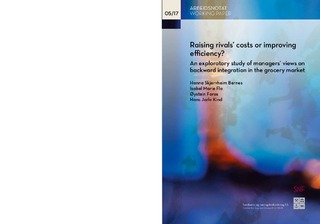| dc.description.abstract | Large retail grocery chains’ backward integration into distribution, procurement and production is controversial, and has received a lot of attention by both policymakers and market players. If a large retail chain for instance takes over scale intensive distribution activities from its suppliers, direct distribution from these suppliers to other retail chains might become more expensive (and might even initiate costly industry‐wide backward integration). An interesting question is thus whether large retailers undertake backward integration mainly for efficiency reasons or whether they do so in order to gain a competitive advantage through raising the costs of the smaller rivals. Theory and econometric analyses are inconclusive. The current study uses a survey to investigate managers’ views on this issue. The study is explorative, and thus does not formally test different theories, but our findings indicate that large retail chains’ incentives to backward integrate are mainly related to efficiency rationales. | nb_NO |
